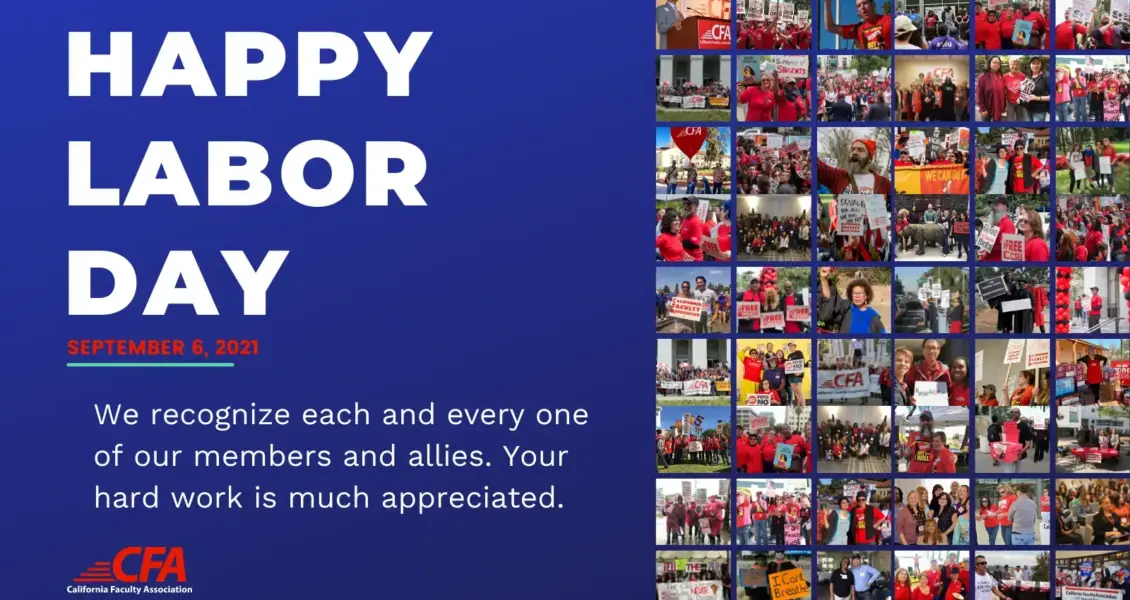Fight to Win: Importance of Labor and Unionism

When we fight, we win.
It’s a meaningful phrase for CFA member leaders and activists, knowing all too well that without continuous advocacy, working conditions could worsen and a work-life balance could be lost.
The unceasing advocacy by CFA and labor unions is why we celebrate Labor Day. We know full well how so little removed America is from some of its most grim chapters.
“For far too long, workers were brushed aside without a voice and without respect for their lives. They were chewed, spit out, and replaced, going through some of the most inhumane working conditions imaginable,” said Margarita Berta-Ávila, CFA Associate Vice President, North. “Without unions, these conditions would exist today. And in some cases, still do, so our work is more important than ever to protect our workers.”
According to History.com, in the 19th century, “the average American worked 12-hour days and seven-day weeks” to barely make a livable wage, while Africans and African Americans in the country were held captive in chattel slavery for the majority of this century.
Extremely unsafe working conditions were the hallmark of job sites and labor unions grew out of these moments, organizing for strikes and rallies in their pursuit of better pay and hours.
It was on September 5, 1882, the very first Labor Day was born, as 10,000 workers in New York City took unpaid time off to march from City Hall to Union Square, holding the first Labor Day parade in America.
The moment grew. The movement finally recognized its racist roots and the importance of organizing and involving ALL workers.
In 2020, exactly 138 years after the first Labor Day, unions across the country threatened to authorize work stoppages in support of the Black Lives Matter movement, calling for concrete measures that address racial injustice. As the AP reported last year, “The broader labor movement has been vocal since the May 25 killing of George Floyd … In July, organized labor staged a daylong strike with workers from the service industry, fast-food chains, and the gig economy to call out the lack of coronavirus pandemic protections for essential workers, who are disproportionately Black” and Latinx.
Last August – and weeks before Labor Day 2020 – CFA leaders laid out a set of demands that center on redress for systemic racism in the CSU. Included in those demands are upholding the right to protest anti-Black racism, resourcing Ethnic Studies (now a requirement in the CSU system), establishing Black/Africana Studies departments and student centers, and addressing racial pay equity for faculty.
“We set out with goals in mind to make the CSU a more equitable and inclusive higher education system, to better support our Black students and faculty, and to push back against anti-Black racism and the brutality of state violence against Black people,” CFA President Charles Toombs said. “Our work is far from over. It continues as we still aim for end systemic racism once and for all, and pursue a system that will uphold the values for all of our faculty and students. This is what labor does. This is what social justice unionism is all about.
“Furthermore, as we honor and appreciate all workers who keep the U.S. afloat, I must acknowledge a group of workers who are essential to our survival during the pandemic. The pandemic has killed hundreds of thousands of us, brought many of us to the brink of death, and made even more of us sick. Healthcare workers, at every level of healthcare systems, have been there to take care of us, provide comfort, deliver medical care and treatment, and give us human connection. I applaud their dedication and service,” Toombs added.
Join California Faculty Association
Join thousands of instructional faculty, librarians, counselors, and coaches to protect academic freedom, faculty rights, safe workplaces, higher education, student learning, and fight for racial and social justice.